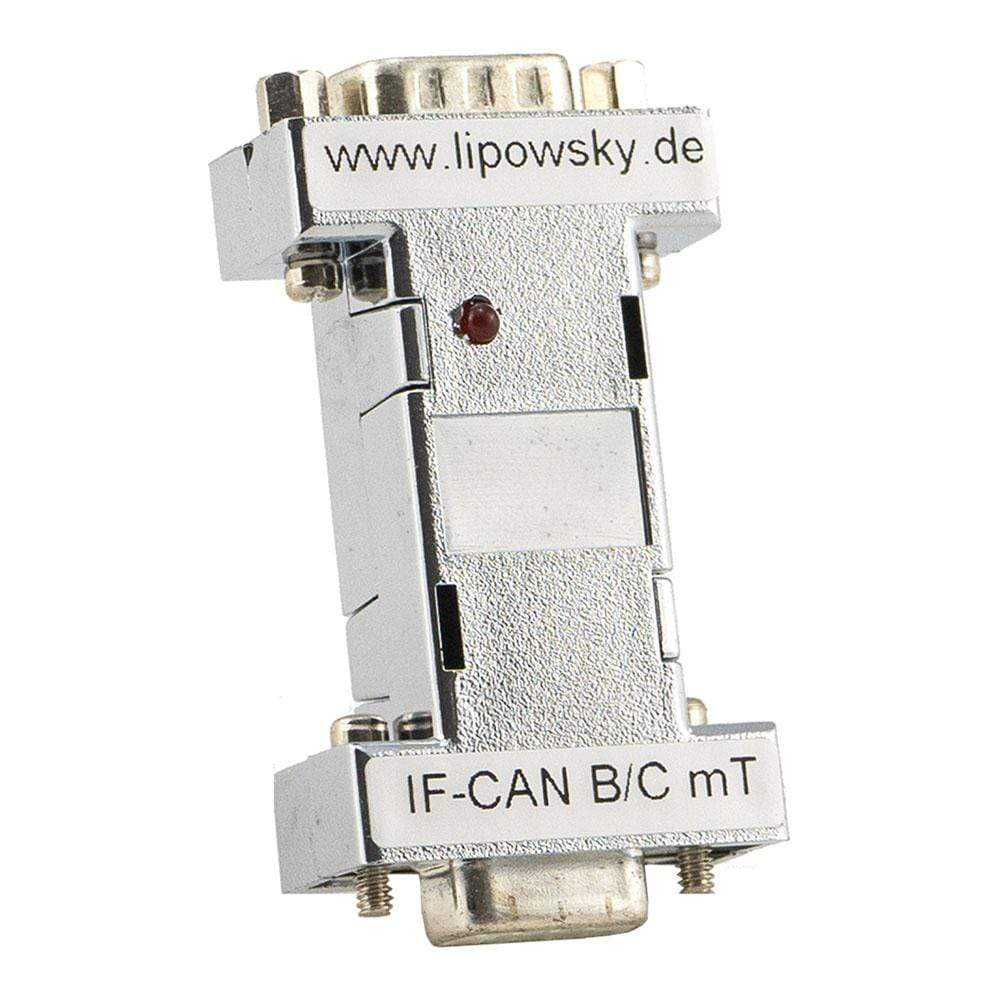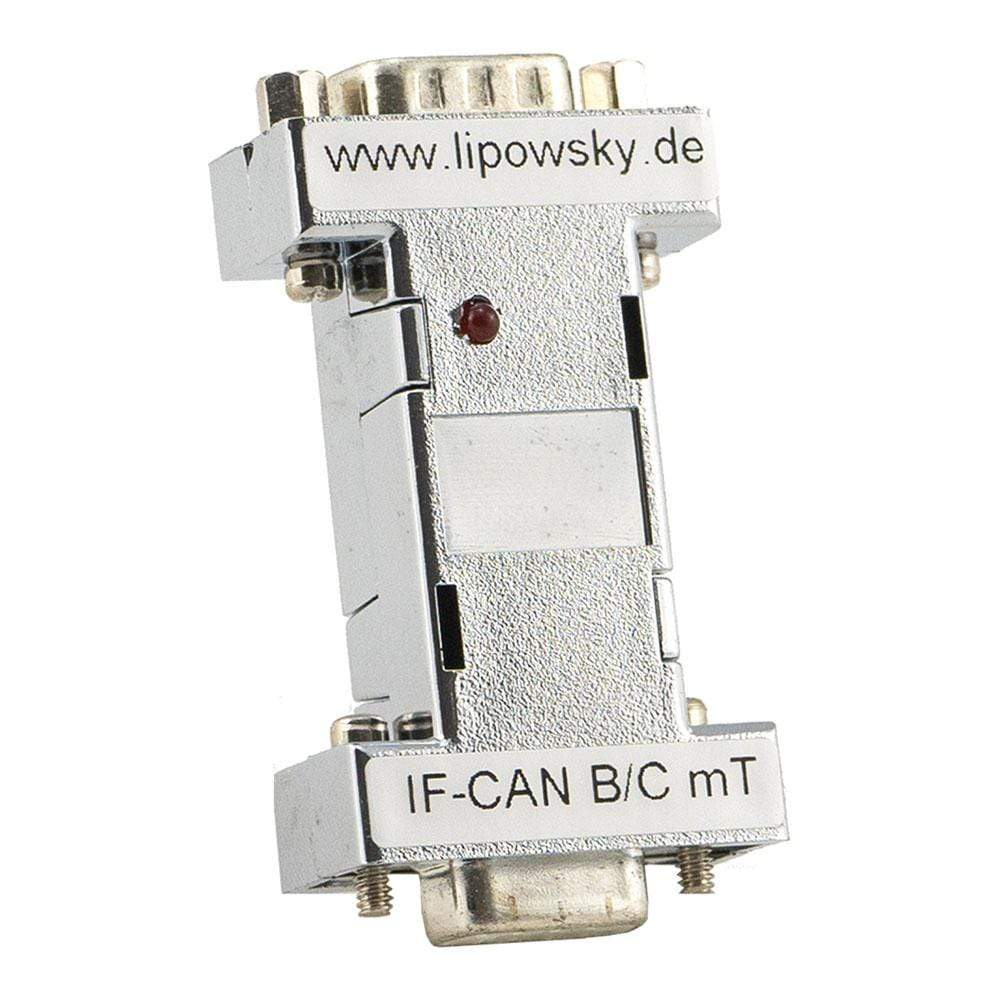
Key Features
Overview
Professional CAN Bus Signal Level Conversion
The Lipowsky IF-CAN-BC-REVE02 is a professional CAN bus converter that bridges the gap between High-Speed CAN (ISO 11898-2) and Low-Speed/Fault-Tolerant CAN (ISO 11898-3) networks. This compact converter enables seamless communication between different CAN bus standards operating at different voltage levels and termination requirements.
Key Applications
Designed for automotive diagnostic applications, test equipment integration, and industrial automation systems where different CAN standards need to communicate. The converter supports bit rates up to 125 kbps and provides galvanic isolation to protect connected equipment from voltage spikes and ground loops.
Enhanced Reliability Features
The REVE02 model includes improved termination handling and enhanced signal integrity compared to earlier revisions. It automatically manages the voltage level conversion between the 2V differential High-Speed CAN signals and the larger voltage swing Low-Speed CAN signals (up to 5V differential).
This converter is essential for connecting modern CAN analysis equipment like the Lipowsky Baby-LIN-3-MB to Low-Speed CAN networks, or for integrating legacy Low-Speed CAN devices into High-Speed CAN systems. Perfect for automotive engineers working with mixed CAN environments or developing gateway applications.
Downloads
Why Engineers Choose The Lipowsky IF-CAN-BC-REVE02 CAN Bus High-Low Speed Converter
Different CAN Standards
Protect Expensive Test Equipment
Simplify Diagnostic Access
Frequently Asked Questions
Have a Question?
-
What safety certifications does the IF-CAN-BC-REVE02 hold?
As a professional industrial device from Lipowsky, it meets relevant EMC and safety standards for industrial automation equipment. Unlike lower-cost alternatives, it provides reliable operation in demanding environments.
-
Can multiple converters be daisy-chained together?
While technically possible, daisy-chaining multiple converters may introduce cumulative delays and should be avoided. Each converter should connect directly between two different CAN bus segments for optimal performance.
-
Does the galvanic isolation affect signal integrity or introduce delays?
The galvanic isolation is designed to maintain signal integrity while providing protection. Any signal delays introduced are minimal and within CAN protocol tolerances, ensuring reliable communication.
-
Is the converter suitable for automotive diagnostic applications?
Yes, this converter is ideal for automotive diagnostics, allowing modern High-Speed CAN diagnostic tools to access older vehicles with Low-Speed CAN networks, particularly in comfort electronics and body control modules.
-
What termination is required for proper operation?
The High-Speed CAN side requires standard 120Ω termination at bus ends. The Low-Speed CAN side has configurable termination resistors built into the converter that can be switched on or off depending on your network topology.
-
Can I use this converter bidirectionally?
Yes, the converter works bidirectionally, allowing communication from High-Speed to Low-Speed CAN and vice versa. The conversion is automatic and transparent to the connected devices.
-
Will this converter work with my existing PEAK or Kvaser CAN interface?
Yes, the IF-CAN-BC-REVE02 is compatible with most professional CAN interfaces that provide standard DB9 CAN connections and 5V power output, including PEAK PCAN-USB and Kvaser Leaf series adapters.
-
Does the converter require external power supply?
The converter typically draws power from the High-Speed CAN side through pin 1 of the DB9 connector (5V supply). Most professional CAN interfaces from Debug Store can provide this power requirement.
-
Can the IF-CAN-BC-REVE02 handle CAN FD (Flexible Data Rate) signals?
No, this converter is designed for Classical CAN (CAN 2.0A/B) only. CAN FD requires different timing characteristics and higher data rates that exceed the converter's 125 kbps limitation on the Low-Speed side.
-
What is the difference between High-Speed CAN and Low-Speed CAN?
High-Speed CAN operates at up to 1 Mbps with 2V differential signalling and requires 120Ω termination at both ends. Low-Speed CAN operates at up to 125 kbps with larger voltage swings (up to 5V differential) and uses distributed termination at each node, providing fault tolerance if one wire breaks.

